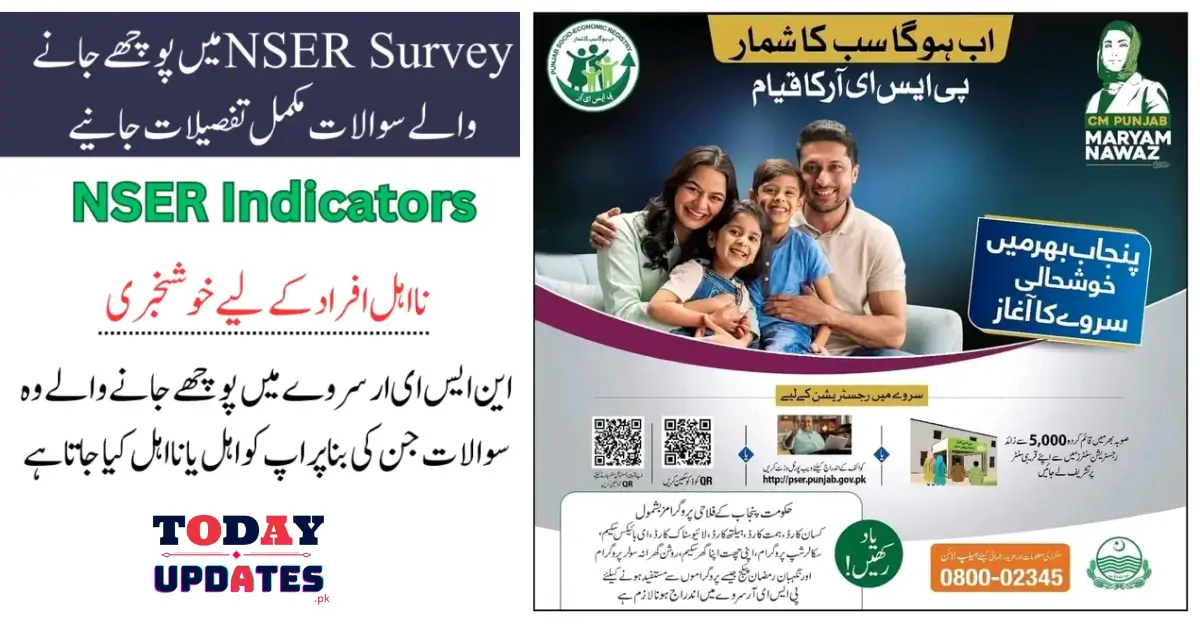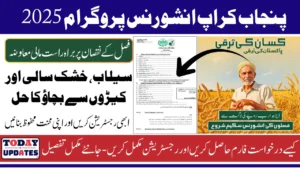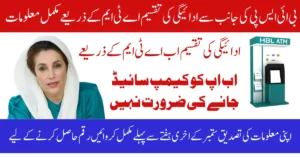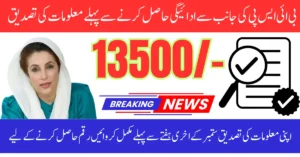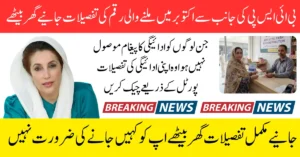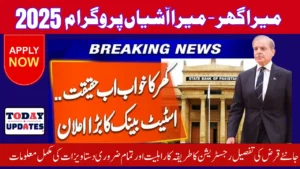NSER Indicators for BISP
The NSER Indicators Dynamic Registry was launched in 2011 by the Benazir Income Support Program in Pakistan. It aimed to gather detailed information about how families in the country are doing financially. This information helps the government determine who should receive assistance from various programs.
When the government creates new programs like the Benazir Income Support Program or the Ration Program, it looks at NSER data to decide who can join. The NSER data is quite large, containing about 27 million families. It is a good source of information to find the right people who need help from various welfare programs.
Also, Read: Bahimat Buzurg Program Registration
NSER Survey
NSER representatives play an important role in this process. They go to people’s homes and collect accurate and up-to-date information directly from them. This helps ensure that the data collected is reliable and truly reflects how people are doing financially and socially.
Since its inception in 2011, NSER has been truly instrumental in both public and private programs that help people. The information from NSER has been very helpful for the government to formulate good plans and programs to deal with money and social problems.
This data has been used for over 10 years and has been helpful for various government projects. By using this detailed information from NSER, the government can find and help the right people who need help. This ensures that social assistance programs are well-targeted and reach those who need them.
NSER Indicators for BISP
A new registration procedure was introduced in the BISP program. Now NSER survey of all families will be done. Due to this financial assistance will be given to poor and deserving families. It should be remembered that the Government of Pakistan has established more than 600 BISP tehsil offices for dynamic surveys. Where the NSER survey is going on.
To get the NSER survey, go to your nearest BISP tehsil office with your National Identity Card number and card. Your NSER survey will be conducted in the BISP tehsil office Questions to be asked in the NSER survey. Remember that different questions are asked of the people going for the NSER survey. They have to answer. You have to answer these questions correctly.
Also Read: Ehsaas 8171 Portal Launched For Online Registration Just CNIC Number
NSER Online Registration
Remember that based on these questions, your financial and economic status is also estimated. After which you are made a part of the Benazir Income Support Program and Ehsaas Program. So that you can get financial assistance from the Benazir Income Support Program and Ehsaas Program. Below are some of the questions asked within the NSER survey. Who will help you in the registration process?
NSER Indicators 2024 ( این ایس ای ار سروے میں پوچھے جانے والے سوالات )
NSER uses a bunch of different information to decide who is registered in its program. There are 24 things they look for to know if someone can join the BISP program or not. These things are called indicators. Depending on how these indicators look for a home, they may or may not qualify for the BISP program.
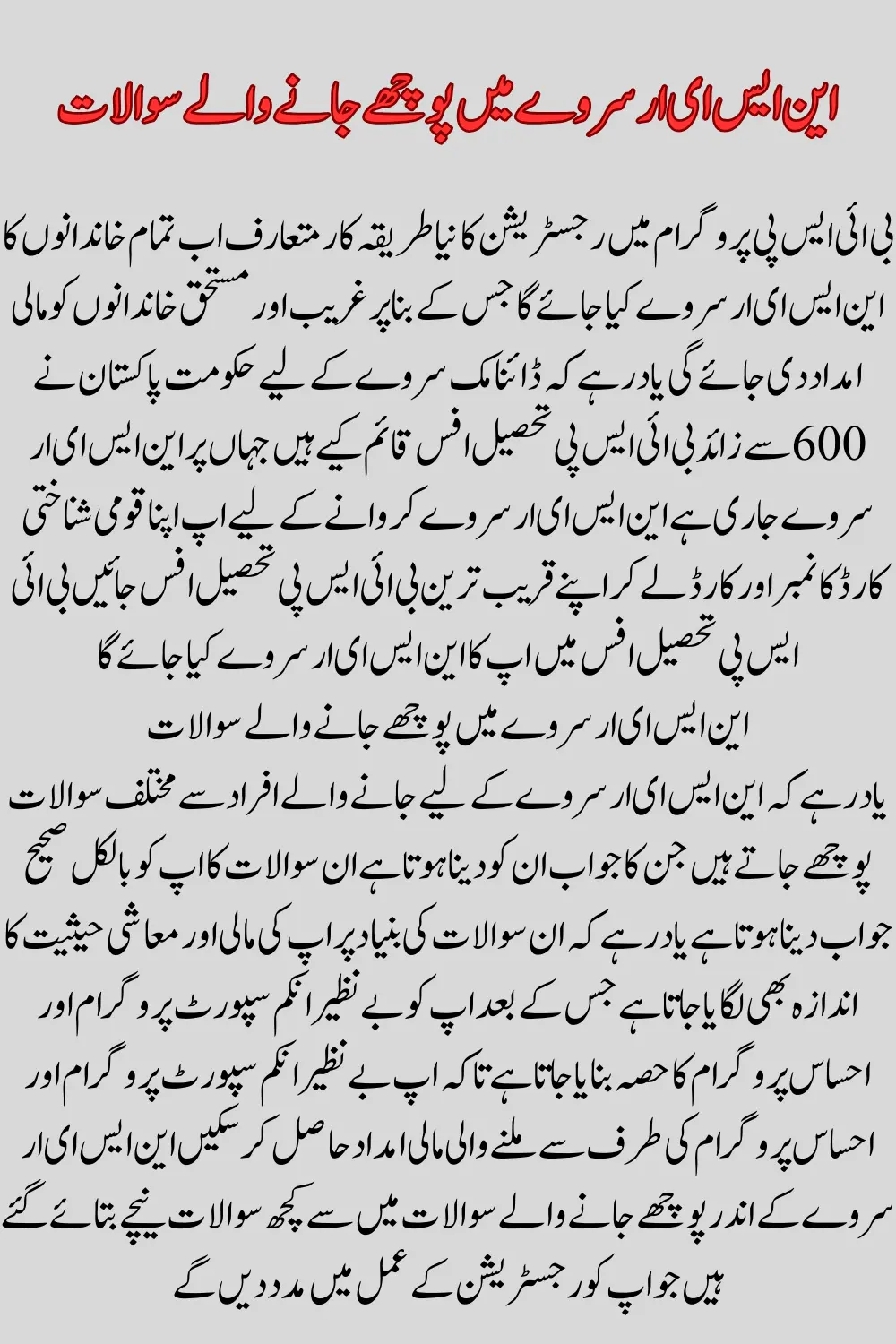
NSER collects detailed information using 24 indicators to assess eligibility for the BISP program and to understand various aspects of households in Pakistan:
Socio-Economic Status: (سماجی و اقتصادی حیثیت)
Questions about monthly income, household expenses, and overall financial situation to assess socioeconomic status.
- Leaving school: (اسکول چھوڑنا)
Information on primary, middle, or secondary school dropout status and reasons behind it.
- Out-of-school children (5-17 years): (اسکول سے باہر بچے (5-17 سال))
Data on non-school attendance of children aged 5 to 17 years and reasons for their absence.
- Quality of Education: (تعلیم کا معیار)
Details about the children’s education level, whether they are in college, public schools, or private institutions.
- Adult Literacy Level: (بالغوں کی خواندگی کی سطح)
Information was collected on the literacy level of adults within the household.
- Job Profiling: (ملازمت کی پروفائلنگ)
Employment data including government or semi-government employment status, workplace details, and type of employment (temporary or permanent).
- Disability Profiling: (معذوری کی پروفائلنگ)
Questions about disabilities or health conditions, treatment received, and nature of treatment.
- Stillbirths or infant deaths: (اب بھی پیدائش یا بچوں کی اموات)
Information about deceased children, including the cause of death, date of birth, and death.
- Disease Profiling: (بیماریوں کی پروفائلنگ)
Data on diseases affecting household members, treatment status, and reasons for non-treatment.
Types of Housing Structure: (ہاؤسنگ سٹرکچر کی اقسام)
Details about home design and construction, such as self-build or professionally built homes.
- Availability of latrines/rate of open defecation: (لیٹرین کی دستیابی/کھلے رفع حاجت کی شرح)
Information about the bathroom’s location, construction, and installation dates.
- Fuel wood consumption/deforestation rate: (ایندھن کی لکڑی کا استعمال/جنگلات کی کٹائی کی شرح)
Questions about household fuel sources (eg wood or gas) and the percentage of wood obtained from forests.
- Metered connection (electricity and gas): (میٹرڈ کنکشن (بجلی اور گیس)
Details regarding electricity and gas meter connection, duration, and related bills.
- Child Labor and Workforce Profiling: (چائلڈ لیبر اور ورک فورس کی پروفائلنگ)
Information on children’s work status, nature of work, and monthly income.
- Animal Husbandry Practices – Large Animals: (مویشی پالنے کی مشق – بڑے جانور)
Data about the ownership, status, sale, or trade of large animals.
- Animal Husbandry Practices – Small Animals: (مویشی پالنے کی مشق – چھوٹے جانور)
Details of small animal rearing and population changes.
- Households using covered drinking water: (ڈھکے ہوئے پینے کا پانی استعمال کرنے والے گھریلو)
A source of drinking water such as a pump, piped water, or well.
- Use of domestic drinking water: (گھریلو پینے کے پانی کا استعمال)
Alternative sources of water for households without potable water facilities.
- Ownership of agricultural land: (زرعی زمین کی ملکیت)
Information on agricultural land ownership, size, and crops grown.
Owning a home internet connection: (گھریلو انٹرنیٹ کنکشن کی ملکیت)
Details about home internet connections and related bills.
- Home UPS/Generator/Solar Panel Ownership: (گھریلو UPS/جنریٹر/سولر پینل کی ملکیت)
Information on having a UPS, generator, or solar panels for alternate power.
- Satisfaction with various state institutions: (مختلف ریاستی اداروں سے اطمینان)
Feedback on the level of satisfaction with local institutions like police, administration, courts, etc.
- Ineligible Persons: (نااہل افراد)
Individuals who are not receiving BISP but wish to register their information.
- International travel: (بین الاقوامی سفر)
Details of international travel for Hajj, Umrah, or other purposes, including dates of departure and return.
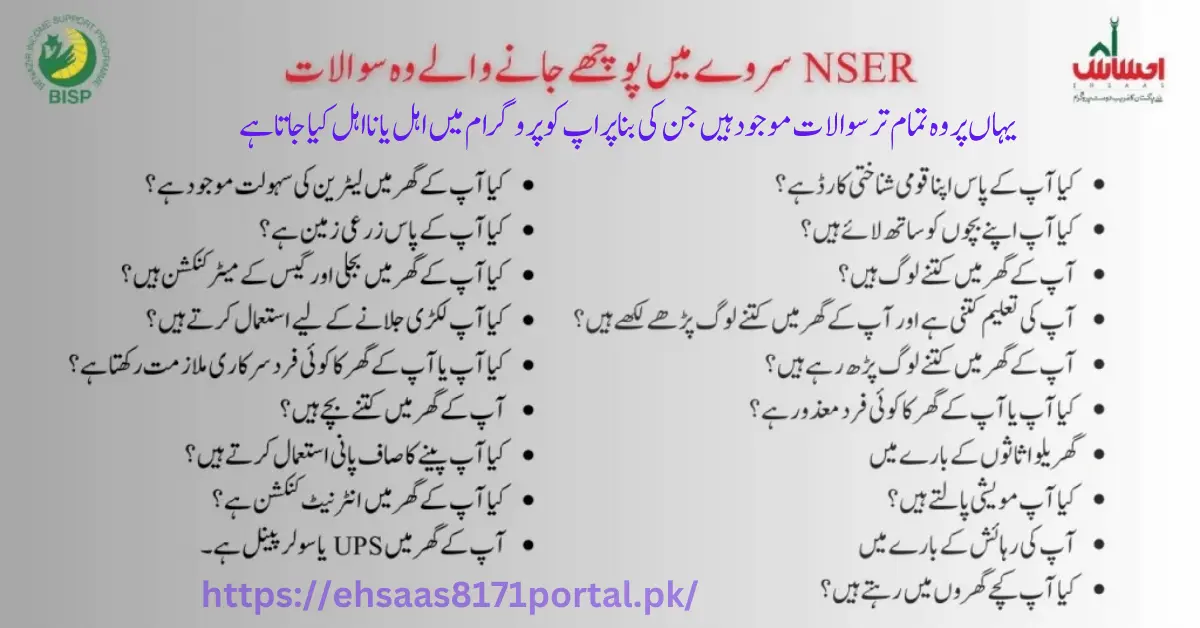
Required Documents For NSER Registration
To successfully register for BISP, you will need to submit the following documents:
- National Identity Card (CNIC): This card serves as proof of your identity and citizenship.
- Children’s Bay Form: If you have children, this form is required to register them in the program.
- Education Certificate: Your education certificate is required to verify your education level
- Tenancy agreement: If you are renting a house, provide a copy of the tenancy agreement as proof of your residence.
- Residence Certificate: This certificate verifies your current residence and is required for the registration process.
Latest Update BISP Program Online Registartion 2024
Dear viewers, remember one thing the government of Pakistan has announced new registration in the Ehsaas program and BIS program. This registration has started only in the Benazir Income Support Program office. The government of Pakistan has established a Benazir office in every Tehsil. So that the poor can get convenience and get money by registering themselves easily.
Note that there is no online registration for this program. Because the government of Pakistan has not yet set up an online registration system for the BISP program. As soon as the online registration starts, you will be notified first through this website. So don’t register online because it will waste your time and you won’t get money. So to register you can go to the Benazir office established in your area and get your survey done.
